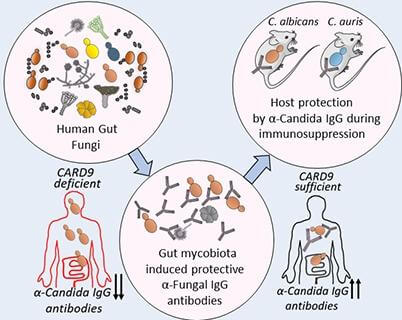It is common for forms of fungi to be present in the gut. The fungi in the gastrointestinal tract train the immune system to fight off other hazardous fungi that could infect the body. New findings by researchers at Weill Cornell Medicine demonstrate this biological process. The study gives insight into developing treatments that may aid the elderly and immunosuppressed patients in fighting off and surviving dangerous fungal infections in the bloodstream.
Lessons From Fungi
The research centering on gut fungi links to studies on patients with inflammatory bowel disease (IBD). Individuals with IBD tend to have more fungi present in the gut than those without the disease. These common fungi cause patients with inflammatory bowel disorders to acquire a robust immune response to mannan, which is a molecule in many fungal species. Additionally, the healthy controls in the study produced anti-fungal antibodies without fungal infection. Researchers speculate that milder fungi species in the gut build antibodies that defend against more deadly forms of fungi that cause life-threatening fungal infections.
Researchers determined a heavy immune system response protecting against Candida albicans yeast in healthy human control patients. Scientists replicate this response in animal models by saturating the gut with C. albicans. The influx of these gut fungi leads to the formation of fungal antibodies that also fight harmful fungal species in the bloodstream without developing a deadly fungal infection, according to study results.

(Image courtesy of the Iliev lab.)
The immune cells in the animal models show signs of transporting fungal antibodies into the spleen, which stimulates the creation of antibodies that circulate into the bloodstream. “Those fungi just educate that immune response,” explains Dr. Iliyan Iliev in a statement. Dr. Iliev is a senior author of the study and an associate professor of immunology in medicine in the Division of Gastroenterology and Hepatology at Weill Cornell Medicine.
Prospective Treatments
Fungi in the gut that moves to the bloodstream can be detrimental to elderly patients or individuals with weak immune systems due to cancer or organ transplants. However, the results of this study show that common gut fungi, like C.albicans, may act as a vaccine to the gastrointestinal tract.
The antibodies formed from nonpathogenic gut fungi will cling to and eradicate the pathogenic fungi invading the bloodstream. With this discovery, medical professionals gain the ability to infuse or promote the formation of anti-fungal antibodies in patients to help them fight fungal infections within the bloodstream.
This pioneering study provides insight into the complex relationship between related microbes and their effect on human health. Understanding this interaction can lead to future treatments and preventions and a higher survival rate of patients battling pathogens of the drug-resistant type.
This study is published in Cell.
